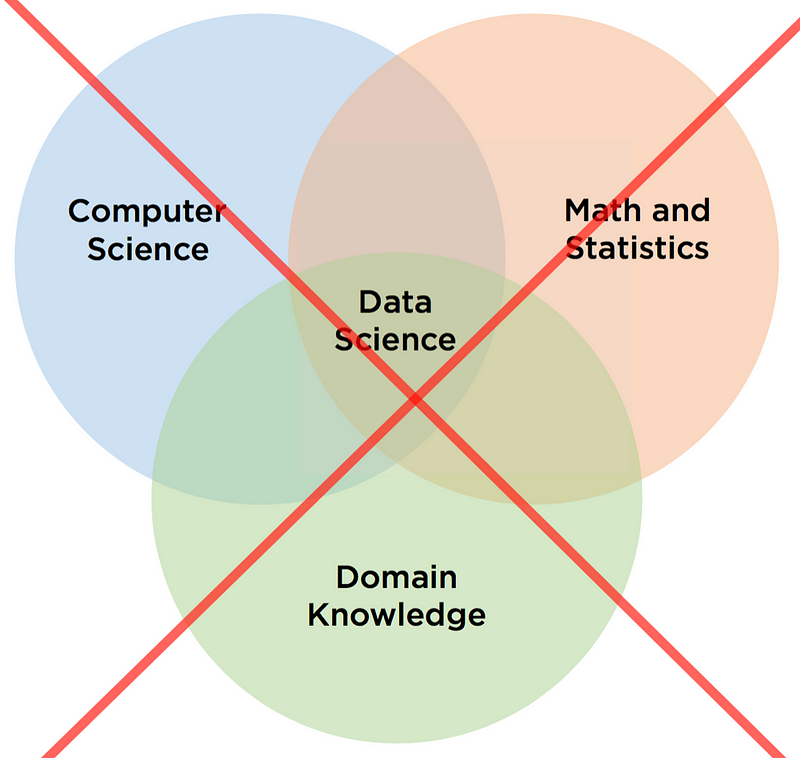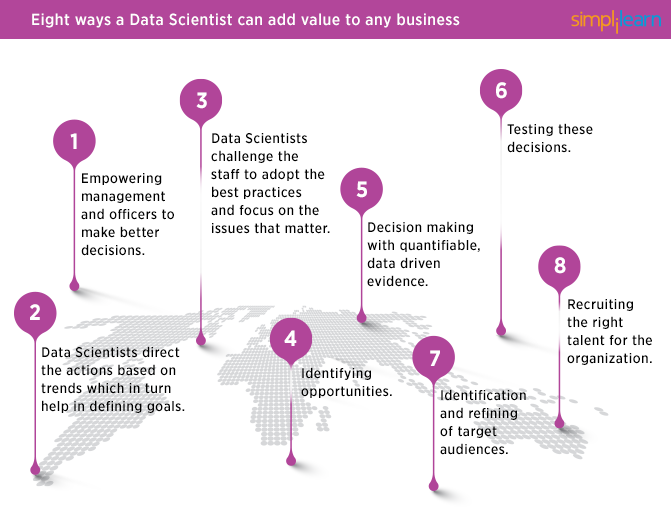Ready to learn Data Science? Browse courses like Data Science Training and Certification developed by industry thought leaders and Experfy in Harvard Innovation Lab.
Are you a Data Scientist looking for a Job? Are you a Recruiter looking for a Data Scientist? If you answered yes or NO to this questions you need to read this.

Hello! This is a blog post I’ve been waiting a lot to write. Mostly because I needed to do my research and listen to what other people have to say about this.
I consider myself a Data Scientist, not a recruiter, but thanks to an amazing conversation I had with Amanda Voss and more recruiters in the area of Data Science and IT I have an idea now of both sides of the story: the DS looking for a job, and the recruiter looking for the best DS for a position.
Before starting, if you want to know more about my personal experience looking for a job as a Data Scientist read my blog: “How to get a job as a Data Scientist?”
The Data Scientist side

So you are a Data Scientist, or you think you are getting closer to be one, and you started looking for a job in the area. My first suggestion: be patient! This is not an easy task, and maybe you will apply to hundreds of job before getting one.
Of course, it could be really easy and fast process, but in my experience this will take you at least (approx) 100 applications and several months.
Learn from each application, each rejection. When I started applying for jobs I had to deal with a lot of rejection. Something I was actually not prepared to. I think no one prepares you for rejection, but if you get something from this is, it’s ok! it’s normal and not personal!

Every rejection is a step on your way to success. It’s not easy to fit in every characteristic that the employer may want, or have the right experience, or maybe just cultural fit.
If you are lucky enough you will get an amazing recruiter that will let you know what happened and how you can improve for future interviews or processes. Recognizing your flaws and weaknesses is the beginning of getting better. This frustration you feel now, or you may feel use it to improve and get better every time.
Three Key points to have in mind about the process

- Some people have no idea what Data Science is. So study the company you are applying for, see what their employees are doing, look for the way the communicate, their Facebook, LinkedIn, Twitter, talks and webinars. And see if they are doing something that interests you.
- The recruiter is your best friend at the moment of interviews, they want to help you get in. So trust them, let them help you and ask questions!
- People are generally more interested in how you solve problems and how you deal with some specific situations than your technical knowledge. Of course is important to write good quality code and have a full understanding of what you are doing, but there’s more than that.
Some advice to get a job as a Data Scientist
- Be patient. You will apply for maybe hundreds of job before getting one (hopefully not).
- Prepare. A lot. Not only studying important concepts, programming and answering business questions, also remember that you will be an important piece of the organization, you will deal with different people and situations, be ready to answer questions about how would you behave in different work situations.
- Have a portfolio. If you are looking for a serious paid job in data science do some projects with real data. If you can post them on GitHub. Apart from Kaggle competitions, find something that you love or a problem you want to solve and use your knowledge to do it.
- The recruiter is your friend. The people interviewing you too. They want you to get in the company, that’s a powerful advise that I remember everyday.
- Ask people about what they do. I recommend that you follow Matthew Mayo post on “A day in the life of a Data Scientist” to have a better idea of what we do.
- If you want an internship, have your academic skills on point.
Creating a Resume and a Life (what?) to get that job

Advice from Mark Meloon:
If you have something you want the reader or listener [interviewer] to know, you’d better put that up front in your message. For resumes, that means you lead with your strongest aspect. Maybe that’s your education. Maybe it’s your job experience.Don’t feel that you have to follow the order in that resume template you downloaded.
When an interviewer asks, “Tell me about yourself”, you don’t need to give them a chronological account of your life story. Start by telling them what your #1 strength is.
More from Mark:
You want to communicate your passion for the field? Do some personal projects. Contribute to open source. Start a blog. Heck, be active […] on LinkedIn.
Words are cheap; actions are what counts.
And in our competitive field, you want to avoid doing anything that will cause people to not take you seriously.
Advices from Kyle Mckiou:
Turn every bullet point on your resume into a mini story. You’ve probably already got a full page of text, and it’s probably cluttered with one-sentence junk that says “I did this” or “we did that.” Go ahead and delete half of that.
Now that you’ve freed up some space, start expanding on the remaining accomplishments.
Use the STAR format to give each bullet point context and to turn it into a detailed mini story with a resolution.
It’s better to have a few standout stories and accomplishment on your resume than a whole lot of “stuff.”
More from Kyle:
[when communicating with the recruiter] boil your communication down to 3–5 sentences that explain:
– Why you’re interested in the job and company
-Why your skills and background make you a good fit.
Also, be excited and passionate.
Outwork the competition.
Advices from Eric Weber:
Want to make an impact as a data scientist? Don’t only look at what is being done, but also what is NOT being done. Write out a list of the Top 5 things you could do to help the company. Then pitch your ideas.
Why?
1. It is hard to be self-critical. Examining what is not being done is hard but can push you outside the comfort zone of “let’s just keep things running like they are”.
2. Business moves fast. It can be hard to get out of the “get shit done” mentality when things seem to be on fire. But stepping away from that mentality provides a chance to be truly innovative.
3. You know the data really well. Very few others do. Understanding the potential of data is a data science job, not always something that management can always do.
4. Writing out a list forces you to track your thoughts over time. You commit it to paper and it will stick with you. In contrast, just thinking about something doesn’t always make it stick.
5. You must sell your ideas. Simply writing them is okay but without you pursuing your ideas to management, they won’t get off the ground. Pick your favorite one and start identifying its impact and ROI for the company.
Thinking, writing, and selling. Push yourself to do this regularly and you’ll find all sorts of new ideas to share.
Advices from Beau Walker:
Over the past ten years I’ve applied to 898 jobs on LinkedIn. I know this because LinkedIn keeps track. (Thanks for the reminder LinkedIn!)
This number doesn’t include the jobs I’ve applied to on other platforms or directly on employer sites. It also doesn’t include the numerous recruiter emails, InMails, and phone calls I’ve received.
Want to know how many jobs I’ve actually taken as a result of these activities?
Zero. Zilch. Cero. нуль. It’s true.
I’m 0–898 for jobs from LinkedIn! And I’ve never actually taken a job that I’ve found through a job board or recruiter.
I get asked a lot about how to find a job. And I talk a lot with people who are discouraged by the application process.
My advice? Consider alternative approaches to finding a job. In the past 10 years, every job I have taken has come from networking. The best jobs often do.
Advices from Vin Vashinta:
[…] when you’re in the mode of answering questions, it’s tough to start asking them. When you’re in the mode to impress, it’s tough to expect the same in return. Remember that hiring is a 2-way street.
Leave an interview with the team wanting more but also expect to leave the interview with the same desire yourself. Were YOU impressed? What did they do to make YOU feel welcome? You’ve put in work to get to where you are now. Gravitate towards those businesses that lift you up rather than diminish all you’ve achieved.
Great companies put in work to leave every candidate blown away, even the ones they don’t hire. Amazon is an excellent example of a company that has impressed me with their hiring process. I’ve had multiple dealings with their recruiters; always professional, quick to respond, & bringing roles that are good fits for my capabilities.
Advices from JT Kostman, PhD:
The problem most likely has to do with how you think about your resume.
Q: What is the job of the resume?
A: Wrong. It’s not to get you a job — or even an interview, or to the hiring manager. The job of the resume is to make it past the shredder. Period. Full stop.

Most […] peole who get your resume have absolutely no idea what we really do; they just have a list to check. They’re looking for keywords — not concepts. Most of the them are not going to be bothered with having to pan for gold. They’re going to give it less than a minute (literally) and move on to the next one on their pile.
Be honest: Is your resume so simple even some Bozo in HR/Recruiting can see how you would be a near ideal match? And is it about you? Or are you clearly showing (not telling) how you would benefit the hiring manager AND the company — including ensuring she can take fewer Tums every day? Are you connecting the dots for HR and drawing them a map?
Probably not.
Read all of that advices, and look for more. They are great. Some a little be hard to read, but they are true.
So what do I have to tell you to improve your life as a DS and also your resume? Here is my list:
- Be honest. Don’t undersell or oversell your self in your resume.
- Connect and be active in the data science community. Create blogs, share your knowledge, participate in open source projects.
- Be clear. Read your resume and ask yourself: is this how I want to be seeing?, be sure that you are putting the things that you think are the most important for you and the company you are applying for in the begining.
- Don’t send the same resume to every company. This is very close to the last point, and it’s a hard job. But believe me you’ll see results much faster. Analyze the company and create a resume specific for that position.
- Keep it short. They get thousands of resumes everyday, so they will only expend around 30–60 seconds reading yours. So be sure that you are putting there the things they want to see. Don’t put there stuff that is not relevant for the company.
- Be consistent. That means same font and style everywhere.
- Tell your story. Those bullets you see in your resume are you. So tell the story of your life in a way you and them will like it. If you are stronger on academic skills be sure to put that before the experience part, or vice versa.
- Ask the recruiter for advise before sending the resume.:
More Advice
General interview tips

Before going to some advices for the interview, here’s a list of a “common” process when applying for a Data Science position:
- A phone call where they will ask you about you and your experience. This is the first phone screen.
- If everything goes well you’ll get a second call, this time maybe from some Data Scientist that work in the company. This is the second phone screening. They will ask you more about you, your experience and also some technical questions. This is more likely to see if the things you said in your resume are true.
- (Optional) Data science task. They’ll send you a dataset and ask you several questions to see your abilities as a data scientist. Be really clear here. Write good quality code.
Advices from Kyle Mckiou to write good quality code as a Data Scientist:
Writing quality code is critical for data scientists, especially in 2018 and beyond.
As data science practices mature, more companies will demand automation, reproducibility, scalability, portablitiy, and extensibility for data science projects. To make this a reality, you had better be ready to write quality code.
Here are 10 tips to get you started as a data scientist:
1. Refactor aggressively. Don’t tack new code onto the end of a script when you should refactor
2. Follow style standards, e.g. PEP-8 for Python
3. Code defensively — always think about what could go wrong!
4. Avoid globals and minimize the scope of variables
5. Take those scripts and turn them into programs — create organized systems
6. Always unit and integration test
7. Automate your tests
8. Create a rigorous review process
9. Follow the rigorous review process, even when you don’t want to!
10. Provide honest, critical feedback as a reviewer and be open to feedback when your code is being reviewed
4. Whiteboard programming. This maybe the harderst and more intimidating part of any process. Programming in a blank space. Just you and a piece of paper. Practice this a lot. You don’t need to write the code here perfectly, they want to see you thinking and getting into the solution. Talk and describe your thinking process, don’t be there quite.
5. (Optional) Day of coding in the company. This is the final task, is not that common, but is an invite for their company to be there for a full day, seeing what they do and solving some programming tasks.

Advices for the interview? Here are the ones I could find, they are great:
Brandon Rohrer: https://brohrer.github.io/how_to_interview.html (READ THIS!!!)
The Recruiter side

If you are a recruiter for Data Science positions, first see whom is Data Scientist. Not an easy question but here’s my short answer to that:
A Data Scientist is a person in charge of analyzing business problems and give a structured solution starting by converting this problem into a valid and complete question , then using programming and computational toolsdevelop codes that clean, prepare and analyze the data to then create modelsand answer the initial question.
What data science is not:

We are much more than this.
Why is Data Science important?
Data Science and Analytics exists because hidden in the data there are treasures waiting to be discovered.

The Ways a Data Scientist Can Add Value to Business:

From simplilearn.
1. Empowering management and officers to make better decisions
2. Directing the actions based on trends which in turn help in defining goals
3. Challenging the staff to adopt best practices and focus on issues that matter.
4. Identifying opportunities
5. Decision making with quantifiable, data-driven evidence.
6. Testing these decisions
7. Identification and refining of target audience
8. Recruiting the right talent for the organization
Do you always need a Data Scientist?
Actually no. I recommend that you read these articles on the subject,
From those, an important quote I can take is:
… leveraging a data science team appropriately requires a certain data maturity and infrastructure in place. You need some basic volume of events, and historical data for a data science team to provide meaningful insights on the future. Ideally your business operates on a model with low latency in signal and high signal to noise ratio.
Without these elements in place, you’ll have a sports car with no fuel. Ask yourself if more traditional roles like data analysts and business intelligence may suffice.
Remember this words: A bad data scientist is way worse than don’t have a data scientist at all.
There’s lot of people wanting a job in Data Science, most of them are really intelligent people, wanting to help and have a path in this area, but be careful before hiring one. I recommend that you search for data science descriptions in the best companies out there, learn about their process, and learn from them.
Also, is not true that they need a PhD to be the best data scientists. They need experience working with data and solving business questions using data science. Before asking for a PhD, ask for knowledge, projects they have worked on, open source projects they built or collaborate, Kaggle kernels they created, related job experience, how did they solve an specific problem.
Data science is not just an IT area, is IT+Business, you need to be sure that the data scientist you hire can adapt to the company, understand the business, have meetings with stakeholders and present their findings in a creative and simple way.
Read this blog post for more information:
and from there some important tips to recruit data scientists:
- Recruiters, work closely with hiring managers to build out accurate job descriptions.
- Iron out nuances to distinguish which types of data scientists will be the best fit for the business’ needs. Hone in on the skillset and experience of the type of data scientist you’re looking for.
- Think long term. Understand how the org plans to leverage this role within the product roadmap.
- Set realistic expectations of available candidate pool. There are more roles than candidates, so recruit accordingly.
- Build a list of ideal candidates and calibrate with hiring manager to gauge fit against reality of talent market.
A good quote on the recruiting process from Vin Vashinta:
Aspiring data scientists want 1 thing from the companies that don’t hire them: an explanation. In many cases their only response is silence. How’s an aspiring data scientist supposed to know what to work on, if companies won’t tell them?
Aspiring data scientists aren’t psychics, but they are hardworking & willing to learn. They’ll rise to the challenge if companies start telling them where the bar is.
Peel back the hiring process at most companies & you’ll find they can’t objectively answer the question, “Why didn’t you interview or hire this person?” I teach clients how much they can learn by examining the candidates they reject as closely as they examine the people they hire.
There’s value to both candidates & employers in the answer to that question. Companies have an opportunity to improve their hiring process. Candidates get the opportunity to be better prepared for their next application with the company.
Beyond the value, it’s the decent thing to do for someone who took the time to apply. Hiring is all about making connections. Silence shows the company doesn’t care enough to treat people the right way. That’s something candidates remember.
I hope this post will help everyone in the Data Science world. Let’s join together and help each other transform the world into a better place. Remember to have fun and that there’s much more in life than work, I love what I do, but take time for your family and friends, be happy and be kind to one another.




